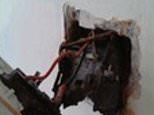Chancellor’s Green Homes Grant must not go to dodgy cavity wall insulation firms, ministers warn
Rishi Sunak’s Green Homes Grant cash must not go to dodgy cavity wall insulation firms, ministers warn as 800,000 homes are revealed to be uninhabitable with damp, mould and unsafe electronics due to shoddy work
- Campaigners call on government to protect homes from insulation companies
- Gavin Ward was forced to leave his home in Bridgend after cavity wall insulation
- The poor work left him facing damp, mould and unsafe electrics in his home
By Bhvishya Patel For Mailonline
Published: 05:10 EDT, 22 July 2020 | Updated: 06:14 EDT, 22 July 2020
Ministers are calling on the government to protect homeowners after it was revealed that at least 800,000 homes have had faulty cavity wall insulation installed at their properties.
Following the government’s announcement of a new energy efficiency scheme this month, MPs and campaigners have expressed their concerns about how property owners will be protected from suppliers who fail to meet required standards.
The rising fears come just weeks after the Chancellor Rishi Sunak unveiled a £2billion Green Homes Grant that would allow homeowners and landlords to receive grants of up to £5,000 for insulation and other energy efficiency measures from September.
Sharing his heartache, Gavin Ward, whose insulation work was guaranteed by the Cavity Insulation Guarantee Agency (CIGA), described how he was forced to leave his home in Bridgend, Wales, after it was deemed ‘uninhabitable’ by the council.


Gavin Ward was forced to leave his home in Bridgend, Wales, after it was deemed ‘uninhabitable’ by the council. He later shared a series of photos on social media of the damp, mould and poor electrics he was left with


The property owner said his home was deemed ‘uninhabitable’ by the council after it was found poor cavity wall insulation
Mr Ward, who was faced with unsafe electrics, damp and mould, said his ordeal began three years prior when he had cavity wall insulation fitted by the company Miller Pattison.
A later examination by a surveyor revealed that the insulation company had not removed the debris from inside the cavity before injecting the mineral wool insulation.
Mr Ward told MailOnline: ‘Our install was done in April 2011 by Miller Pattison. Their pre-installation inspection was not done to standards. Only one inspection hole was drilled in one wall.
‘They are supposed to be in each elevation to check for rubble and cavity depth. It transpires that our home had a significant level of rubble in the cavity, along with other issues that would have made it unsuitable from the start.
‘Having not assessed the house correctly they ploughed ahead and did the install. They then installed it negligently – again not having knowledge at the time we did not know this.
‘Their drill pattern was incorrect, they did not fill to a correct density, did not install a brush strip, areas were left out and the house was in a location unsuitable for cavity wall insulation.
‘We didn’t notice problems until late 2016 and not for one minute did we think it would have been to do with the cavity wall insulation that was installed to make the house warmer and more energy efficient.
‘We did notice our bills increasing but thought that was just due to energy prices – and not that the insulation was becoming wet / saturated. Again could not see it on the inside wall surfaces, as it was going on within the cavity.’
After looking for advice online, Mr Ward found that his problems were due to a faulty cavity wall insulation.
He continued: ‘I looked online for advice and saw others with similar problems. I arranged for an assessment and was told that it was due to the cavity wall insulation.
‘I instructed a solicitor as it was evident that the damage by far exceeded the CIGA guarantee of £25,000. At the point of sending the initial letter of claim from our solicitor (in March 2017) the level of damage was circa £40,0000.’
Mr Ward, whose son’s bedroom was also found to have mould, also told the BBC: ‘What can be worse than feeling you have failed your child?’
Despite his efforts to get the insulation company to correct the problem, Mr Ward said he would not be able to receive any money.
He added: ‘These companies know the problems the insulation is causing and yet they are allowing families to live in conditions like this.’


Earlier this month Chancellor Rishi Sunak unveiled a £2billion Green Homes Grant that would allow homeowners and landlords to receive grants of up to £5,000 for insulation
Cavity wall insulation involves injecting materials, such as mineral wool or polystyrene beads, through holes drilled on the outside walls and is carried out to help property owners remain warm.
However there are now increasing calls from campaigners and MPs to investigate registered installers with the industry-funded body CIGA who have left properties in a state of disrepair.
While the the CIGA has since admitted that the insulation by the company in mr Ward’s case should not have been installed and have offered to have it removed, they said they will not pay the £60,000 repair bill.
Mr Ward’s ordeal is among thousands of stories which have seen homeowners homes fall victim to poor insulation, campaigners say.
Criteria for cavity wall insulation
In order to have cavity wall insulation your home must meet certain criteria.
This includes having unfilled external cavity walls, having a cavity of at least 50mm wide, your masonry or brickwork being in good condition, the house being at least 20 years old and the walls not being exposed to driving rain.
You also can’t have cavity wall insulation if you have damp patches on the inside walls.
Pauline Saunders, from the Cavity Insulation Victims’ Alliance, CIVALLI, told the BBC that much of the work carried out by earlier schemes had left affected some of the most vulnerable in society.
Ms Saunders, who last year was shortlisted for Inside Housing’s Women in Housing Awards, went on to say that some in the industry ‘treat people like idiots’.
Meanwhile the Labour MP for Bristol North West, Darren Jones, has said that he had written to ministers asking how property owners would be protected following the new scheme.
According to the CIGA’s website, the independent body provides 25 year guarantees for Cavity Wall Insulation fitted by registered installers in the UK and Channel islands.
MailOnline has contacted the Cavity Insulation Guarantee Agency for comment.
In his mini-Budget this month, Mr Sunak confirmed a £2billion Green Homes Grant from September would mean homeowners and landlords could get grants up to £5,000 for insulation and other energy efficiency measures.
Some of the lowest income households will get the full costs of energy efficiency refits paid up to £10,000.
The types of improvements to be offered include wall-to-wall insulation, energy efficient boilers, double or triple-glazed windows, low-energy lighting and insulated doors.
The funding also includes £1billion to improve the energy efficiency and low carbon heating for schools, hospitals, prisons, military bases and other public buildings and £50 million to pilot ways to cut carbon from social housing.
Mr Sunak claimed that his eco-boosting measures would make 650,000 homes more energy efficient, save households up to £300 on their annual bills, cut carbon emissions by 500,000 tonnes and support 140,000 jobs.
How will Rishi Sunak’s Green Homes Grant work?
Chancellor Rishi Sunak insisted he wanted to see a ‘green recovery with concern for the environment at its heart’ as he rolled out his mini-Budget today.
As part of this, Mr Sunak confirmed a £2billion Green Homes Grant from September will mean homeowners and landlords can get grants up to £5,000 for insulation and other energy efficiency measures.
Some of the lowest income households will get the full costs of energy efficiency refits paid up to £10,000.
It is not clear what qualifies as a lower or higher income under Mr Sunak’s definition.
The types of improvements to be offered include wall-to-wall insulation, energy efficient boilers, double or triple-glazed windows, low-energy lighting and insulated doors.
The scheme is to be launched in September when online applications will be accepted for the recommended home improvements, as well as details for accredited local suppliers.
Households will then be sent vouchers which can be used at the suppliers.
![]()


